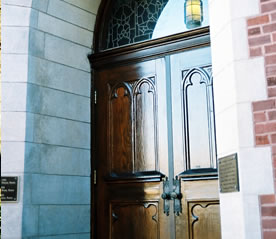Who’s In Charge?
 Tuesday, August 28, 2007 at 04:04PM
Tuesday, August 28, 2007 at 04:04PM  When the door opened to the salesman’s knock, he was startled to see a ten-year old boy standing just inside, puffing on a long, black cigar and holding a can of beer. Regaining his composure, the salesman frowned and asked, “Is your mother home, young man?” The boy flicked the ashes from the cigar onto the carpet, took a sip of brew and replied, “What do you think?”
When the door opened to the salesman’s knock, he was startled to see a ten-year old boy standing just inside, puffing on a long, black cigar and holding a can of beer. Regaining his composure, the salesman frowned and asked, “Is your mother home, young man?” The boy flicked the ashes from the cigar onto the carpet, took a sip of brew and replied, “What do you think?”
This picture explains exactly why resident authority is so necessary in a home. Without authority, chaos reigns. It is also why children don’t want authority. With no one to tell them what to do, they can do whatever they want. Eventually, however, everything falls apart.
“Question authority,” the bumper sticker reads. And why not? Those in the ruling class supposedly only seek to perpetuate themselves. What right to they have to reign over the lives of others? Doesn’t power corrupt? Arguments like these sound logical to the natural mind, but they contain the seeds of anarchy and destruction. God is not the author of confusion. Lucifer’s rebellion, Eve’s disobedience and Saul’s phony excuses grew from these same thoughts. Whether rebellion comes dressed in robes or rags, its disguise never works. “And Samuel said, Hath the LORD as great delight in burnt offerings and sacrifices, as in obeying the voice of the LORD? Behold, to obey is better than sacrifice, and to hearken than the fat of rams.” I Samuel 15:22
If our generation continues to savage its authority structure, we will soon have a tower of Babel on our hands. God built spiritual leadership into the church, the home and family, and every building block of society. Divorce, absentee parents and the epidemic of illegitimacy have bombarded the family unit, but their blows have only proven the need for strong authority more than ever. In the church, even though abuses of power, flawed characters and failed leaders have deeply hurt us, we cannot function without rightly regarding authority. Consider the following:
Authority is the strength of every group. Man is the head of the woman, but only because he himself is under Christ. The mother represents and uses the father’s authority over the children. Every company, association, organization and group of people working together can only operate under a specified chain of command. To an enlisted man or woman, the salute is the most basic way to recognize the importance of authority and rank.
The local church will collapse without the authority of the pastor. He serves as the conscience, the spiritual barometer, the definer of rules, and overseer of every activity. His solid and wise leadership conveys a sense of security and order to the church. The need for this authority never grows obsolete.
The saint will flounder without the authority of the pastor. Individual church members need a God-ordained pastor as a ruling authority in their lives. Spiritual experiences, scriptural revelations, dreams, visions, angelic visitations, theories, ideas, superior intelligence, talent, education, relatives in the ministry, longevity in the church, books, tapes or radio ministries cannot replace a flesh-and-blood pastor. He who resents authority probably has a reason. He may harbor a secret desire for something he knows is out of bounds. He may pamper an overblown ego that envisions himself equal to or better than the pastor.
Ministers themselves need authority over them. From the time I became a pastor, I taught the church that they were not at the mercy of a pastor who was outside an authority structure. Safeguards were in existence that protected them against abuse or departure from true doctrine. They had the right to appeal to a presbyter, a district superintendent or an organizational official if it ever became necessary. I strongly believe that danger lurks close by whenever one casts off authority and accountability. Anytime one gets the feeling that he can do anything he wants without consequence, he invites disaster. Deacons, elders, bishops and apostles were instituted in the early church to ensure orderliness in the ministry as well as the members of the churches. One cannot teach obedience and submission unless he models the same.
The number one lament of education today is that bedlam in American classrooms has sabotaged the learning process. It all started with “progressive” educators who felt that discipline stifled creativity. Actually, discipline permits true creativity to flourish. When authority is rightly used, it blesses instead of oppresses. Orderliness sets the atmosphere for serious study. In the church, a stable environment permits growth, encourages discipleship, and keeps the church focused on right things. These are the things that God set in the church, and He had good reasons for doing so.








